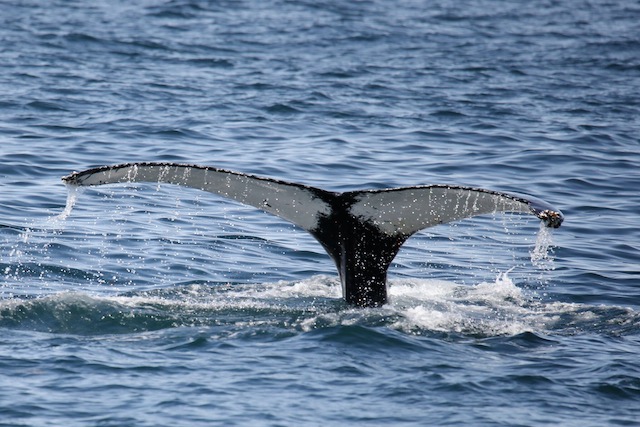Why Can’t We Have Whale Protection Regulations?
NOAA Regulations Not Even On The Public Radar Screen
Environmental Groups And Media Ignore Regulatory Issues
Academic Institutions And Foundations Are AWOL

A whale surfaces on July 8, 2018 just east of Montauk, New York in the Block Island Sound. Bruce Bennett/Getty Images
Why Can’t We Have Whale Protection Regulations?
That was the title of an email a friend just sent that passed on a superb story on the right whale out of Georgia, please read the whole thing:
Federal efforts to protect the whale species, which spends most of the year off the coast of New England, from collisions with ships and entanglements in fishing gear — incidents that represent the two leading causes of death for right whales, according to the National Oceanic and Atmospheric Administration — remain stymied.
That’s because some policies meant to preserve the right whale are also seen as an existential threat to another treasured icon of New England: commercial fishing.
[Read CBD lawsuit against NOAA]
In addition to fishing issues, there are an additional set of regulatory issues before NOAA as a result of a regulatory petition to NOAA from many ocean protection groups: (PEER)
The Ocean Foundation and Public Employees for Environmental Responsibility (PEER) on Wednesday filed a rulemaking petition with NOAA, urging the agency to create “whale safety zones” for all large ships, with mandatory speed limits and other preventive measures.
The petition, the first to propose a nationwide minimum standard to reduce vessel collisions with whales, comes as whale species — particularly the endangered North Atlantic right whale — face increased risks from larger, noisier and faster ships.
In addition to opposition by the commercial fishing industry, there are other reasons that federal regulatory efforts are stalled, including: 1) the politically powerful commercial shipping industry; 2) the bought and paid for NJ Congressional delegation and NJ Governor; 3) the cowardly and corrupt coastal and ocean conservation groups; and 4) a depleted and stenographic media.
These failures are made worse when a Democrat is in the White House, because environmental groups tend to cheerlead and media tend to give democrats a pass on failures.
A Trenton veteran replied to that email question with this explanation:
Because they [NJ conservation groups] are getting big bucks from Orsted Atlantic Shores and PSEG – Orsted lobbyists is Maddy Urbish – Former NJ Audubon staffer /Coalition for Delaware Watershed -LCV Board Member -Murphy staff – etc
Here was my reply to my friend who ask such an important question:
XXXXX – good question.
Why don’t we even hear or read about these regulatory issues from NJ coastal groups and NJ media?
The Pinelands Preservation Alliance just wrote an Op-Ed in NJ Spotlight on whale deaths and there was not a word about NOAA and regulations.
The same silence comes from Clean Ocean Action, American Littoral Society, NJ Audubon, NJ Conservation Foundation, and virtually every NJ group that pretends to “work” on ocean issues.
Ditto the academic groups – Rutgers and Monmouth University Urban Coastal Institute both have marine programs, but are nowhere to be seen, from where I sit.
Is Pew Foundation still in Philadelphia? Are they doing anything? I saw them in a recent NJ Spotlight story about an event at Monmouth University, but no mention of NOAA and regulations.
Of course you never hear a peep about any of that from the NJ DEP marine and fisheries programs, who are in the pocket of commercial and recreational fishers.
Wolfe